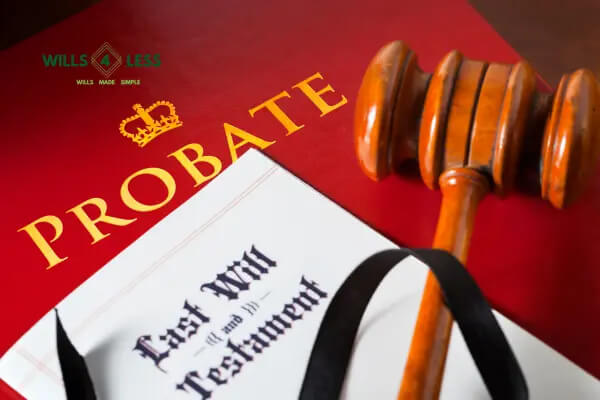
Probate Costs in the UK – What You Need to Know
-
Probate is the legal procedure for handling someone’s estate after they pass away, including assets, debts, and distribution as stated in a will or by intestacy rules.
-
Costs can vary greatly depending on the estate’s size, its complexity, the use of professional services, and whether Inheritance Tax applies.
-
Key costs include Probate Registry fees, solicitor or probate specialist fees, valuation charges, and possible Inheritance Tax.
-
Executors can manage costs by considering DIY probate for simpler estates or fixed-fee professional services for clarity on total charges.
-
Professional advice from solicitors often proves invaluable when dealing with complex assets, minimizing tax liabilities, and ensuring the deceased’s wishes are accurately carried out.
Introduction to Probate Costs
At Wills 4 Less, Losing someone dear can turn your world upside down. In the UK, probate is the legal process required to tidy up a loved one’s estate after they pass on. That includes verifying any will, settling outstanding debts, and distributing assets to beneficiaries. Yet, understanding probate also means confronting its costs. These fees can differ wildly based on factors such as estate complexity and tax obligations. This guide sheds light on probate costs, helping you navigate them with greater confidence.
The Basics of Probate in the UK
Death usually leaves property, bank accounts, or other belongings that must be handled properly. Probate ensures those wishes (as stated in a will) are respected. It covers identifying all assets, clearing debts, and distributing whatever remains to beneficiaries. If no will exists, the law decides who inherits.
Probate is essential because it empowers an executor (or administrator) to act on behalf of the deceased—think bank accounts, real estate, and other financial matters. Without an official Grant of Probate, nobody can legally finalize these tasks. That’s why probate underpins the lawful and efficient management of a departed person’s estate.
Understanding Probate Costs in the UK is crucial for anyone navigating this complex process, as it helps to anticipate and manage the expenses involved.
Defining Probate and Its Importance
In simple terms, probate confirms who can settle a deceased person’s financial affairs. If there’s a valid will, the named executor seeks a Grant of Probate. If there’s no will, an administrator applies for Letters of Administration. Either way, that official document lets them pay bills, close accounts, sell property, and distribute what’s left.
It matters because, without probate, families often find themselves in limbo. Disputes can arise. Banks remain uncooperative. Assets sit frozen. Probate formalizes everything and reduces confusion or legal headaches later.
Overview of the Probate Costs and the Process
The probate journey typically starts with verifying if a valid will exists. If yes, the chosen executor applies for a Grant of Probate. If no will is found (the deceased is “intestate”), a close relative can apply for Letters of Administration.
Once granted, the executor or administrator can collect and value all assets, settle remaining debts or taxes, and then distribute what’s left to beneficiaries. It’s vital to keep clear records, maintain open communication, and follow UK law at every step. This helps avoid delays and tension among those inheriting.
Detailed Breakdown of Probate Costs
Handling an estate involves Probate Registry fees, professional service fees, and other expenses. Understanding these charges allows you to plan effectively. Careful organization and occasional professional help can keep surprises to a minimum.
Probate Costs – Application Fees Explained
Applying for probate incurs a standard fee paid to the Probate Registry. Currently, it’s £273 for estates valued above £5,000. If a solicitor applies on your behalf, the fee can be £155. This charge is separate from additional expenses like Inheritance Tax or solicitor fees. It simply covers the court’s administrative costs for issuing the Grant of Probate.
Professional Service Fees: Solicitors and Probate Specialists
Legal professionals, such as solicitors or probate experts, charge varying fees. Some work on hourly rates, which can quickly mount up if unexpected complications arise. Others offer fixed fee probate services that provide clarity and peace of mind. Deciding which route to take often depends on the estate’s complexity and your willingness to handle legal paperwork alone.
Additional Costs: Valuation Fees and Unforeseen Expenses
While the probate application fee and professional costs form the bulk of expenses, valuation fees also pop up if you need to assess real estate, expensive artwork, or other items. There can be further outlays, such as:
-
Ordering death certificates.
-
Paying for house clearances or property maintenance.
-
Advertising legal notices in newspapers (helpful if there might be unknown creditors).
Having some financial cushion for these extras can preserve your sanity. Surprises are rarely fun when money is at stake.
Inheritance Tax and Its Impact on Probate Costs
Inheritance Tax (IHT) is a tax on the wealth someone leaves behind. If an estate is worth more than the £325,000 threshold (after deductions like funeral costs), then IHT might be due. Executors must understand when IHT applies and how to pay it to avoid fines or delays in the probate process.
Calculating Inheritance Tax: Thresholds and Rates
IHT applies to the value of the estate above the £325,000 threshold. The standard rate is 40%, although various exemptions or reliefs can reduce that figure. If you pass assets to a spouse or civil partner, you often avoid IHT altogether. Executors who miss crucial reliefs risk overpaying, while errors might invite scrutiny from HM Revenue and Customs.
How Inheritance Tax Influences the Total Probate Costs
Paying IHT reduces what beneficiaries ultimately receive. It also adds complexity to probate, which can translate into higher solicitor fees or financial advisor charges. Estates with property portfolios, foreign investments, or businesses often require specialized valuations. That extra expertise can push up costs.
It’s wise to weigh IHT obligations early to see where professional guidance might be cost-effective.
Avoiding Common Pitfalls in Probate Costs
Probate can become thorny when executors procrastinate or fail to verify the will’s legitimacy. Delays or misunderstandings lead to missed deadlines and can escalate legal fees. If there’s no will—or one that’s out-of-date—arguments among beneficiaries can erupt.
Stay organized. Communicate proactively. Seek expert advice when needed. These steps reduce headaches and help you avoid unwelcome probate surprises.
Misunderstandings Around Will Validity
Even minor technical errors can render a will invalid. Missing signatures, incorrect dates, or improper witness procedures open the door to legal challenges. That uncertainty can increase probate costs. Ensuring a will meets legal standards—and remains up-to-date—keeps everyone’s stress levels down.
Issues with Estate Valuation and How to Address Them
Valuing an estate accurately is crucial. Underestimating certain assets, like a classic car or a small business, can cause trouble if HM Revenue and Customs investigates. Overestimation, however, might push you into paying more Inheritance Tax. When in doubt, consult professional valuers, especially if the assets span property, multiple investments, or niche collectibles.
Options to Manage or Reduce Probate Costs
Probate costs need not soar sky-high. Executors can consider a DIY approach for modest estates, where assets are straightforward and there’s little risk of dispute. More complex situations might benefit from a solicitor’s expertise, especially with multiple properties, debts, or foreign assets.
DIY Probate: Is It Right for You?
DIY probate involves collecting forms, applying for the Grant of Probate, and distributing assets without hiring a lawyer. It can save money but demands time and attention to detail. Simple estates where all beneficiaries cooperate may suit the DIY route. However, if you lack confidence in legal matters or expect friction among heirs, bringing in a probate specialist can spare you a migraine—or three.
Choosing Between Fixed Fee Services and Hourly Rates
When using a probate solicitor, compare fixed fee vs. hourly billing. Fixed fees let you know your total expenses upfront. That’s helpful if the estate is straightforward or your budget is tight. Hourly rates are more flexible and can be beneficial if the situation is unusually complex. But the final bill can balloon if problems keep cropping up.
Gather multiple quotes. Ask for clear outlines of each service. Decide which structure aligns best with your estate’s complexity and personal comfort level.
When to Seek Professional Advice to Save on Costs
Well-intentioned executors sometimes avoid hiring a specialist, hoping to save money. But in estates involving foreign properties, business shares, or heavy debts, a solicitor or tax advisor can actually reduce your overall costs. They spot potential legal or tax pitfalls early. They also ensure you comply with strict deadlines and guidelines, which, if missed, might cause fines. Back to Homepage
Remember, professional advice often pays off by preventing costly do-overs or penalties. It’s an investment in peace of mind.
The Role of Executors and Administrators
Executors and administrators shoulder the responsibility of carrying out a deceased individual’s last wishes. They must:
-
Identify and value all assets.
-
Pay final debts and taxes.
-
Distribute whatever remains to beneficiaries.
They act in everyone’s best interest, following the will’s terms—or intestacy rules when no will exists. Their meticulous management preserves harmony among beneficiaries and ensures the deceased’s legacy is honored.
A Quick Fictional Anecdote to Illustrate
Consider Fiona, who discovered her late aunt’s will in a dusty shoebox under the bed. The estate seemed simple—just a small cottage and some savings. She chose a DIY approach. But there was a twist: Auntie also owned shares in a foreign tech startup. Once it was valued, Fiona realized the estate’s worth overshot the Inheritance Tax threshold. Scrambling, she sought professional help and, with guidance, navigated the unexpected complexities. The family eventually breathed easy, but her story reminds us that surprises lurk where we least expect them.
Final Thoughts
Probate can feel daunting, but understanding the costs and options makes it more manageable. Whether you go solo or bring in professionals, proper planning and organization save time, money, and headaches. By knowing the likely fees, respecting the rules, and seeking help when necessary, you’ll guide the estate to a smooth resolution—helping everyone move forward with clarity.
